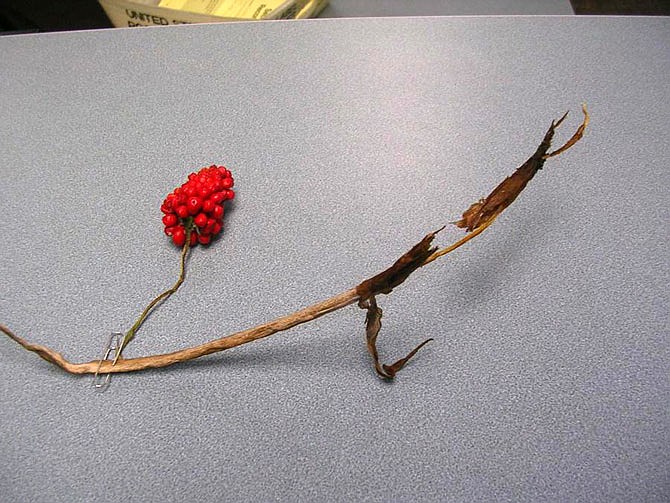Q. What is this red, berry-like thing (see photo)?
A. That is the fruiting structure for the flower of an Arum lily (Arum is the genus). A common Arum many recognize the name of is Jack in the Pulpit, an herbaceous perennial plant growing from a corm (similar to a bulb, like for a tulip) and a widespread spring wildflower many enjoy seeing in the woods. All plant parts are poisonous, so don't eat the berries.
Q. What are these small snakes I found?
A. These are ringed-neck snakes, or Diadophis punctatus, which is a harmless species of the "Solid Tooth and Rear Fanged" family. It is found throughout much of the United States, Central Mexico and southeastern Canada. Ringed-neck snakes are secretive, nocturnal snakes, so they are rarely seen during the day. Their top can vary some in color but is often dark. The yellow band is noticeable, as is their orange end of the bottom side. They are best known for their unique defense posture of curling up their tails and exposing their bright red-orange posterior, ventral surface when threatened.
Q. I have a Bermuda grass lawn, and fescue is showing up. What can I do to get rid of it?
A. The easiest way to control fescue or any other cool season grass (i.e., bluegrass or perennial ryegrass) is to wait for the Bermuda to go fully dormant (turn completely tan). Then spray the fescue with glyphosate (the active ingredient of the popular systemic herbicide Roundup). A good time to plan for this would be mid- to late November. You can retreat in early to mid-March.
Cool season grass is more likely to intrude into Bermuda grass where there is some shade. About the only thing you can do to try and hold the cool season grass back in shady areas is to pay special care to Bermuda grass, in terms of fertilization, mowing height and dethatching. MU Extension offers the publication "Establishment and Care of Zoysiagrass Lawns" with a care portion you can follow.
Q. I've had small holes showing up on my purple leaf plum tree for several years, but I can't find any bugs. What is causing this?
A. It is most likely a disease called bacterial spot of stone fruit. Stone fruit includes all those with a single pit, like peach, plum and cherry. The disease first appears as small, water-soaked, grayish areas on the undersides of leaves. As it progresses, the symptoms vary between the trees, but for plums, it is noted the tendency for infected areas to drop out is greater. This leads to a shot-holed, tattered appearance. Making matters worse, these infected branches can become weakened, leading to them dying in winter.
This is a very challenging disease to control. Planting resistant cultivars is the most effective control measure. Unfortunately, yours is likely not one of those. There are no completely successful spray programs for control of bacterial spot. Chemical sprays with copper-based bactericide moderate efficacy but must be used preventively. Environmental conditions that favor bacterial spot development include heavy rain events when temperatures are above 75 degrees F. Extended periods of hot, dry weather reduce the threat of the disease. If it becomes too much to deal with the disease, or the trees become too unsightly or weakened, you should replace them. A purple leaf smoke bush may be a good alternative.
The Central Missouri Master Gardeners are a volunteer group of 191 members, 122 of whom are Cole County residents, who maintain 11 beautification sites in Cole County, which are nonprofits or public entities. Master Gardeners must complete a basic training program of at least 30 hours of horticultural training, as well as 30 hours of volunteer service. The Missouri Master Gardener program is supported by the University of Missouri Extension.
Have a gardening question of your own? The Master Gardener Hotline is open from 12:30-4:30 p.m. Tuesday and Friday afternoons. Call 634-2824 or stop by the Cole County Extension Center at 2436 Tanner Bridge Road, or email your question to rebecca@newstribune.com for possible inclusion in a future "Ask a Master Gardener" column.

